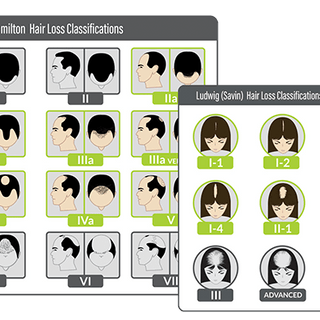Millions of Americans are turning to GLP-1 drugs like Ozempic® and Wegovy® for weight loss*. Alongside the pounds, many are noticing another change: unexpected hair shedding. What began as whispers in online forums now has scientific data to back it up.
The Plot Thickens
The relationship between these revolutionary weight-loss drugs and hair loss reads like a medical mystery novel. Clinical trials for Ozempic didn't initially flag hair loss as a major concern—it showed up in only about 3% of people taking Wegovy compared to 1% taking a placebo. But a groundbreaking study published earlier this year tells a different story.
Researchers at the University of British Columbia analyzed data from nearly 2,000 people taking semaglutide and found something striking: a 52% higher risk of hair loss compared to those taking an older weight-loss drug. More telling still, women seemed to bear the brunt of this effect, with the risk being twice as high for them.
It's not an epidemic, but when millions of people are taking these drugs, those small percentages add up to a lot of frustrated patients staring at their bathroom mirrors.

The Body's Betrayal

Here's where the story gets interesting from a biological perspective. The drug probably isn't directly attacking your hair follicles like some molecular villain. Instead, it's the rapid weight loss itself that's triggering what scientists call "telogen effluvium"—essentially, your hair going into panic mode.
Picture your hair follicles as tiny factories with their own internal clocks. Normally, they cycle through periods of growth and rest in an orderly fashion. But when your body experiences the stress of rapid weight loss—losing 20, 30, or even 50 pounds in a matter of months—those clocks get scrambled. The follicles shift into a resting phase all at once, leading to widespread shedding about three months later.
It's the same phenomenon that happens after major surgery, severe illness, or extreme dieting. Your body, in its ancient wisdom, decides that growing hair is a luxury it can't afford when resources are scarce. The irony, of course, is that people taking Ozempic aren't actually starving—they just feel like they are.
The Nutritional Puzzle
Gary Goldenberg, a dermatologist at Mount Sinai Hospital, sees patients dealing with this regularly. "Because people on semaglutide tend to eat less, they're at risk of developing nutritional deficiencies like iron, zinc, and protein, which are important for healthy hair," he explains.
Think of your hair follicles as hungry little animals that need constant feeding. They're some of the most metabolically active cells in your body, second only to bone marrow cells. When you suddenly cut your food intake in half—which many Ozempic users do—those follicles are among the first to feel the pinch.
Add in the nausea and vomiting that some people experience on these medications, and you have a perfect storm for hair loss. It's not that the drug is toxic to hair; it's that the dramatic lifestyle changes it enables can deprive hair of what it needs to thrive.

A Ray of Hope (Literally)
While doctors have long recommended nutritional supplements and patience—hair loss from rapid weight loss is usually temporary—a different approach is gaining traction: low-level laser therapy.
The Xtrallux laser caps work on a fascinatingly simple principle: they bathe your scalp in red light, much like how plants use sunlight for photosynthesis. The FDA has cleared these devices as effective treatments for androgenetic alopecia, based on clinical studies showing they can increase hair density by 35-51%.**
What makes this approach particularly appealing for people dealing with Ozempic-related hair loss is its complete lack of drug interactions or side effects. You simply wear what looks like a baseball cap embedded with tiny lasers for six minutes a day. The light energy appears to stimulate follicles back into their growth phase, potentially counteracting the stress-induced dormancy caused by rapid weight loss.
Researchers believe the red light triggers cellular processes that promote hair growth—essentially giving sleeping follicles a gentle wake-up call.

The Bottom Line
The Ozempic hair loss story illustrates something fascinating about modern medicine: even our most celebrated breakthroughs come with unexpected plot twists. These drugs have revolutionized the treatment of obesity and helped millions of people regain their health. But they've also reminded us that the human body is an interconnected system where changing one thing often affects another.
For people experiencing hair loss while taking these medications, the advice from experts is clear: don't panic, but don't ignore it either. Work with your doctor to ensure you're getting adequate nutrition, consider treatments like low-level laser therapy if the hair loss bothers you, and remember that for most people, this is a temporary side effect of a profoundly beneficial treatment.
As one patient reflected months after her hair had started growing back: "I'd make the same choice again. Losing weight changed my life. Losing hair was just a detour." It's a sentiment echoed by many who've navigated this particular side effect—a reminder that even medical breakthroughs come with trade-offs, but the benefits often outweigh the temporary inconveniences.
References
- Drugs.com. "Do Ozempic, Wegovy, Mounjaro & Zepbound cause hair loss?" Medically reviewed by Leigh Ann Anderson, PharmD. August 18, 2025.
- Burke O., Sa B., Cespedes D.A., et al. "Risk of Hair Loss with Semaglutide for Weight Loss." medRxiv preprint. March 6, 2025.
- GoodRx Health. "Does Ozempic Cause Hair Loss? Here's What Studies Say." Written by Mitzi S. Morris. August 19, 2025.
- Women's Health Magazine. "New Study Links Ozempic to Hair Loss, Especially in Women." By Korin Miller. March 19, 2025.
- Fox News. "Hair loss more likely with Ozempic, other semaglutide drugs, study suggests." April 3, 2025.
- Good Housekeeping. "Does Ozempic Cause Hair Loss? Experts Reveal the Surprising Truth." April 6, 2025.
- Prevention Magazine. "The Truth About Ozempic and Hair Loss, According to Doctors." By Korin Miller and Emily Goldman. March 20, 2025.
- Xtrallux. "Top Reasons to Choose Xtrallux to Treat Hair Loss." Accessed September 2025.
- Xtrallux. "LLLT Hair Loss Treatment | SMT & VCSEL Laser Therapy." Accessed September 2025.
- *Ozempic® and Wegovy® are registered trademarks of Novo Nordisk A/S.
- **See Indications for Use: https://xtrallux.com/pages/indications-for-use






